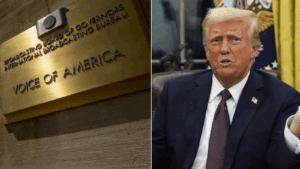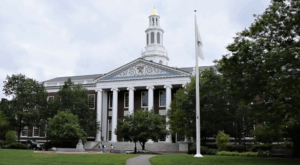As tensions rise, Harvard stands firm against federal pressures, igniting a debate over academic independence and government influence.
**Trump Administration Threatens Harvard Amid Ongoing Dispute Over Antisemitism Policies**

**Trump Administration Threatens Harvard Amid Ongoing Dispute Over Antisemitism Policies**
The White House's escalating demands may jeopardize Harvard's foreign student enrollment and funding.
In an unprecedented move, the Trump administration has threatened to revoke Harvard University's ability to enroll foreign students, following the institution's refusal to comply with a series of demands aimed at addressing antisemitism on campus. The confrontation comes as the White House imposes a funding freeze, impacting approximately $2.2 billion in federal support.
Homeland Security Secretary Kristi Noem has requested records concerning what she describes as "illegal and violent" incidents involving foreign student visa-holders, warning that noncompliance could result in the loss of the "privilege of enrolling foreign students." In response, Harvard President Alan Garber declared the university's commitment to uphold its independence and constitutional rights, asserting that the administration's requests jeopardize the institution’s intellectual integrity.
International students currently comprise over 27% of Harvard's enrollment, underlining the potential implications of the administration's threats. Beyond foreign student enrollment, Trump's administration is also considering revoking Harvard's valuable tax-exempt status, a move that could incur substantial financial losses for the university. Harvard officials have firmly contended that there is "no legal basis" for such actions, warning that they would hinder the university's educational mission.
Trump's criticisms extend beyond funding; he has denounced Harvard as no longer a "decent place of learning." This attack aligns with a broader governmental focus on what it perceives as universities failing to adequately combat antisemitism, with at least 60 institutions currently under evaluation by the administration’s task force on this issue. The controversy highlights the growing divide in American perceptions of higher education, particularly within conservative circles that assert universities promote a political agenda.
Instances of pro-Palestinian protests on campuses have further complicated this landscape, with some Jewish students reporting feelings of unsafety and harassment. In contrast, universities like Columbia have acquiesced to certain government demands following funding reductions, prompting questions about academic autonomy amid external pressures.
Harvard's administration has previously made concessions, dismissing leaders from its Center for Middle Eastern Studies in response to criticisms. However, the university's steadfast refusal to comply with the latest White House demands suggests a growing confrontation between federal authority and academic independence, leaving the future of Harvard's funding and foreign student enrollment in a precarious position.






















